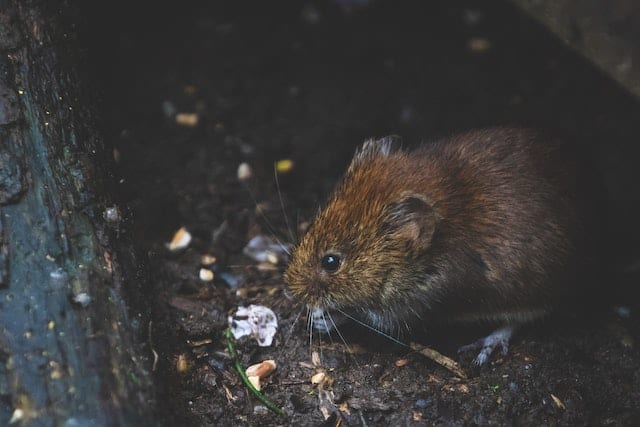Hamster bites can be dangerous and can cause infections if not treated properly. Hamster bites carry bacteria that can lead to serious health complications if left untreated.
Hamsters are popular pocket-sized pets loved for their small size and cute appearance. However, it’s important to remember that even these tiny creatures have sharp teeth and can bite. While a hamster bite may seem harmless, it can actually be dangerous if not taken seriously.
Hamsters have bacteria in their mouths that, when transferred through a bite, can lead to infections in humans. This can result in pain, swelling, redness, and even more serious health complications if left untreated. Therefore, it is essential to properly clean and care for a hamster bite to prevent any potential risks. We will explore the dangers of hamster bites and how you can protect yourself from them.
What You Need To Know About Hamster Bites
Understanding the dangers of hamster bites: Hamster bites can indeed be dangerous, especially if not properly addressed. While hamsters may appear small and harmless, their bite can cause pain, bleeding, and even infection. It is important to seek immediate medical attention if bitten to prevent any complications. It’s also essential to handle hamsters gently and with care to reduce the risk of bites.
Common misconceptions about hamster bites: Many people mistakenly believe that hamster bites are not serious or that they are harmless due to their small size. However, this is far from the truth. Hamsters have sharp teeth and strong jaws, allowing them to inflict painful wounds. Additionally, some may assume that hamsters only bite when provoked or threatened. While this can be a trigger, hamsters can bite for various reasons such as stress or feeling startled. Proper education is necessary to dispel these misconceptions and ensure individuals fully understand the potential dangers of hamster bites.
The Health Risks Of Hamster Bites
Hamster bites can pose certain health risks that should not be taken lightly. One of the main concerns with hamster bites is the potential for infection. The mouth of a hamster contains bacteria that can easily be transferred into the wound caused by a bite. This can lead to an infection if not properly cleaned and treated. It is important to promptly wash any hamster bites with soap and water and apply an antiseptic to minimize the risk of infection.
Furthermore, hamsters can potentially transmit diseases through their bites. Although the risk is relatively low, there have been cases where individuals have contracted diseases such as lymphocytic choriomeningitis virus (LCMV) from a hamster bite. This viral infection can cause flu-like symptoms and, in rare cases, lead to more serious complications.
The severity of hamster bites can vary depending on various factors. The size and strength of the hamster, as well as the intensity of the bite, can determine the extent of the injury. Younger hamsters may not have developed enough strength to cause significant harm, whereas larger or more aggressive hamsters can potentially inflict deeper wounds.
How To Prevent And Treat Hamster Bites
Hamster bites can be painful and potentially dangerous if not properly prevented and treated. It is important to handle hamsters safely to minimize the risk of bites. Here are some tips for handling hamsters:
- Approach hamsters calmly and gently to avoid startling them.
- Never grab or squeeze a hamster, as this may provoke a bite.
- Always wash your hands before handling a hamster to remove any strong scents that may disturb them.
- Provide proper training and socialization for your hamster to help them become more comfortable with human interactions.
If a hamster bite does occur, it is important to take the necessary steps for first aid and medical treatment:
- Wash the affected area with mild soap and water to prevent infection.
- Apply an antiseptic ointment to promote healing.
- If the bite is deep or shows signs of infection, seek medical attention for further treatment.
Remember, prevention is key when it comes to hamster bites. By handling your hamster safely and providing proper training and socialization, you can reduce the risk of bites and ensure a harmonious relationship with your furry friend.
Understanding The Behavior Of Hamsters
Understanding the behavior of
hamsters is crucial for their proper care. While they are generally friendly and docile pets, it is important to be aware of the
reasons why hamsters may bite.
Interpreting hamster body language and warning signs can help prevent potential bites. Signs such as raised fur, hissing or growling, and flattened ears indicate that a hamster is feeling threatened or fearful. If you notice these signs, it is important to give your hamster
space and time to calm down.
Creating a stress-free environment for your hamster is also essential in preventing bites. Providing a
properly sized and enriched cage allows hamsters to establish their own territory and reduces territorial aggression. The cage should be situated in a quiet area, away from excessive noise and disturbances.
Regular handling and socialization can also help your hamster become familiar with human interaction, decreasing the likelihood of biting.
In summary, being aware of your hamster’s behavior and needs, and providing them with a safe and stress-free environment, will greatly reduce the chances of bites.
Overcoming Fear And Building Trust With Your Hamster
Overcoming Fear and Building Trust with Your Hamster
Fear can greatly impact a hamster’s behavior and ability to trust. When a hamster feels fearful, it may become defensive and resort to biting as a way to protect itself. This can pose a potential danger to both the hamster and its owner. To build a bond with your hamster, it is important to provide positive and gentle interaction. Avoid sudden movements or loud noises that may trigger fear in your hamster. Spend time near its enclosure, speaking softly and offering treats to establish trust. Gradually introduce your hand, allowing the hamster to approach it at its own pace. Consistency and patience are key in gaining your hamster’s trust. Remember, earning trust takes time, but with a calm and understanding approach, you can create a safe and loving relationship with your furry friend.
Biting And Aggression In Hamsters
Hamster bites can be painful, but are they dangerous? It’s essential to understand the difference between biting and other forms of aggression in hamsters. Biting is a natural behavior seen in some hamsters, especially when they feel threatened or scared. However, if a hamster is displaying aggressive behavior consistently, it might indicate an underlying issue.
Aggression in hamsters can stem from various causes, including territoriality, fear, stress, or even illness. It’s crucial to assess the situation carefully and gauge the hamster’s behavior before reacting. If your hamster’s aggression becomes unmanageable or you are concerned about your safety, seeking professional help is advisable.
| Signs of Biting |
Signs of Aggression |
| – Quick, intense bite |
– Lunging or charging |
| – Biting without warning |
– Growling or hissing |
| – Leaving deep marks or drawing blood |
– Tail wagging vigorously |
If you’re unsure whether your hamster is biting or displaying aggression, observing their behavior and consulting with a professional can help you determine the best course of action.
Educating Children About Hamster Bites
It is essential to educate children about the potential risks and dangers of hamster bites. Teaching children about hamster behavior and body language is crucial in helping them understand when a hamster may feel threatened or fearful, which can lead to biting. By setting boundaries and providing proper handling guidelines, we can reduce the risk of hamster bites. Children need to learn to approach hamsters gently and avoid sudden movements that could startle them. They should also be taught to never disturb a hamster while it is sleeping or eating. Additionally, it is important to instill a sense of responsibility and empathy in children when it comes to caring for animals. By teaching them about the needs and requirements of hamsters, children can learn to be mindful of their actions and treat these small creatures with kindness and respect.
The Benefits And Joys Of Owning A Hamster
The Benefits and Joys of Owning a Hamster
People choose hamsters as pets for a variety of reasons. One of the main benefits is the opportunity to bond and form a friendship with these adorable creatures. Hamsters can be loving and affectionate if given the proper care and attention. They are known for their small size, making them suitable for apartment living or homes with limited space. Hamsters are also relatively low-maintenance pets, requiring less time and effort compared to other animals.
Creating a positive and safe environment is vital for the well-being of your hamster. Providing a spacious cage with plenty of room to explore and exercise is important. It is essential to furnish the cage with proper bedding and toys to keep your hamster entertained and mentally stimulated. Additionally, maintaining a consistent feeding schedule and offering a balanced diet is crucial for their health.
A Word Of Caution: Hamster Bites And Allergies
Allergic Reactions To Hamster Bites
Hamster bites can sometimes trigger allergic reactions in individuals. It is essential to be aware of these reactions and take appropriate measures to manage them effectively. Allergies to hamster bites can manifest as
skin rashes, itching, redness, or swelling in the affected area. In some cases, individuals may also experience
breathing difficulties, sneezing, coughing, or wheezing.
Identifying and managing allergies related to hamsters is crucial for those who handle them frequently. If you notice any allergic symptoms after being bitten by a hamster, it is advisable to consult a healthcare professional for an accurate diagnosis.
Informing the healthcare provider about the hamster bite and any prior history of allergies can assist in determining the appropriate treatment.
Preventive measures can be taken to mitigate the risk of allergic reactions to hamster bites.
Regular cleaning of hamster cages and maintaining good hygiene practices can help reduce the exposure to allergens present in the hamster’s fur and saliva. Additionally, wearing protective gloves while handling hamsters can minimize direct contact and prevent bites. Consultation with a veterinarian is recommended for individuals prone to allergies before owning a hamster.
Frequently Asked Questions For Are Hamster Bites Dangerous
Should I Be Worried If My Hamster Bites Me?
If your hamster bites you, it’s important to not panic or worry too much. Hamsters may bite out of fear or defense, but with proper handling and socialization, they can become less likely to bite. If the biting becomes excessive, consult a veterinarian or a hamster expert for further guidance.
Should I Go To The Doctor For A Hamster Bite?
Yes, if a hamster bite causes excessive bleeding, swelling, severe pain, or signs of infection, it’s advisable to see a doctor for proper evaluation and treatment.
Can You Get Rabies If A Hamster Bites You?
Hamsters cannot transmit rabies to humans. Transmission of rabies usually occurs through bites from infected mammals such as dogs, cats, bats, or raccoons. Nevertheless, it is essential to wash the wound thoroughly with soap and water to prevent any potential infection.
Is Hamster Harmful To Humans?
No, hamsters are not harmful to humans. They are generally safe to handle and interact with.
Conclusion
Hamster bites can potentially be dangerous, especially if they break the skin or cause an infection. It is essential to handle hamsters gently and provide proper training to minimize biting incidents. Regular visits to a veterinarian can ensure that your furry friend is healthy and does not pose a risk.
Remember, understanding hamster behavior and providing a safe and comfortable environment can help prevent bites and promote a harmonious relationship between you and your pet.


